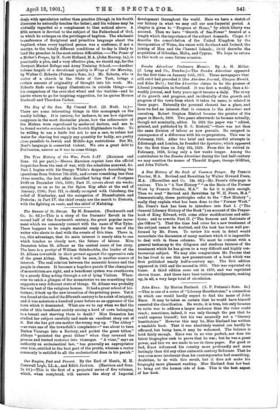The Banner of St. George. By M. Bramston. (Duckworth and
Co. 3s. 6d.)—This is a story of the Peasants' Revolt in the second half of the fourteenth century, the great popular move- ment which we commonly connect with the name of Wat Tyler. There happens to be ample material ready for the use of the writer who elects to deal with the events of this time. There is, too, this advantage, that its main interest is nearly akin to one which touches us closely now, the future of labour. Miss Bramston takes St. Albans as the central scene of her story. The hero is a protégé of William Grindecobbe, the -leader of the St. Albans townsfolk in their protest against the oppressive rule of the great Abbey. Here, it will be seen, is another source of interest. The real relation between the monastic houses and the people is obscure. It becomes a hopeless puzzle if the champions of monasticism are right, and a beneficent system was overthrown by a greedy King acting through a set of lying Visitors. When- ever we catch a glimpse of the monasteries we see something that suggests a very different state of things. St. Albans was probably the very best of the religious houses. It hada great school of his- torians; it took up the new invention of the printing press. Yet it was found at the end of the fifteenth century to be a sink of iniquity, and it was notorious a hundred years before as an oppressor of the town which it dominated. What are we to say when we find the ruler of this beneficent society seizing a herd of cows belonging to a tenant and starving them to death ? Miss Bramston has studied her subject carefully and made an excellent story out of it. But she has got one matter the wrong way up. "The Abbey" —so runs one of the townsfolk's complaints—" was about to turn Barton Vicarage into a Rectory, and pocket the great tithes." Abbeys "pocketed the great tithes" when they reversed the process and turned rectories into vicarages. "A vicar," says an authority on ecclesiastical law, has generally an appropriator over him, entitled to the best part of the profits, whereas a rector commonly is entitled to all the ecclesiastical dues in his parish."






































 Previous page
Previous page